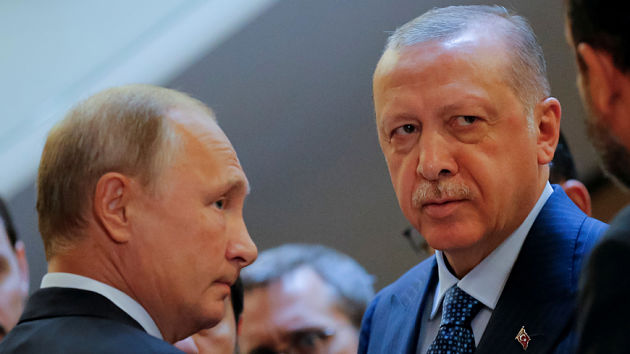A significant part of the world is currently waiting in suspense for the outcome of tomorrow’s meeting between Erdogan and Putin. First and foremost, the residents of Idlib are waiting anxiously, as their fate will largely be decided at this meeting.
Europe is also waiting, because the escalation or preservation of the refugee crisis will depend on whether Erdogan and Putin agree on peace or continue to fight, thereby displacing millions of Syrians to EU countries.
Sensible Turks and Russians are waiting for this, as it will determine whether the two countries can maintain the brink of a major war or whether they will engage in it again. Moreover, considering that one of these countries possesses nuclear weapons and the other is a member of a military bloc that also possesses them, the whole world has reason to worry, because a hypothetical nuclear war would not spare anyone.
But what exactly will be decided tomorrow? Before his trip to Moscow, Recep Tayyip Erdogan declared that he would not allow “the blood of our soldiers to be shed in vain” and would not leave “the oppressed Syrian people alone with the criminal junta”. He also mentioned that “Turkey can fight but does not want war” and stressed that the immediate ceasefire in Syria should be the result of negotiations.
On the whole, if we have realistic expectations for a peaceful negotiation scenario, it is unlikely that Erdogan will be able to return the territories conquered by the Assad regime during its offensive on Idlib to the rebels or achieve their transfer under Turkish control. Theoretically, however, it is possible to withdraw regime forces from these areas and replace them with Russian military police and/or create a joint buffer zone on the line of contact patrolled by Turkish and Russian forces. Is this better than a full-scale war between Turkey and Russia, which is very likely to result from the continued escalation in the region if both sides remain firm in their positions? It is hard to disagree.
However, it is important to realize that even such a compromising outcome for Turkey, which would secure additional territorial gains for the Assad regime and its backers, will require Turkey’s actual involvement in the war and the bloodshed of Turkish troops. But what guarantees that a similar situation will not be repeated? And here we have to mention what has already been written many times – such guarantees this time should be formalized on paper and offered by Turkey itself to both its allies and its enemies, in the form of a promise to automatically declare war in case of violation.
Recently, Turkey has managed to gain the upper hand in the military sphere, on the battlefields. Now it is time to do the same in the political sphere in order to provide a clear answer to the question of the legal grounds and objectives of the presence of Turkish troops on Syrian territory. In order to achieve this, it is necessary to recognize the Transitional Government of Syria as the legitimate authority in the areas controlled by it (de facto by Turkey) and to conclude a mutual defense agreement with it, which legally obliges Turkey to respond to any aggression against it by the regime and provides Turkey with legal and negotiating grounds for doing so.
These steps, taken from a position of strength but aimed at achieving peace, could serve as a clear indicator of the intentions of the parties involved. A hostile reaction to them (not only in words but also in deeds) by the regime and its foreign backers and their continued military actions would mean that the last attempt to avoid a large-scale war has failed. In this case, Turkey would have only two options – to win or to surrender.

